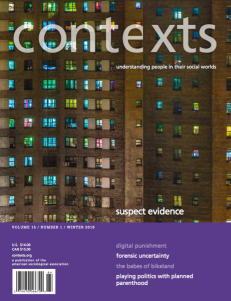
Winter 2016
Volume: 15 | Number: 1
Asian Americans, Bamboo Ceilings, and Affirmative Action
Asian Americans are popularly recognized as successful academic achievers, to the point of stereotype. Over half of Asian American adults have a bachelor’s degree or … Read More
Babes in Bikeland
In Minneapolis, an annual “alleycat” bike race has become a powerful tool to educate and celebrate gender diversity in the cycling community. Read More
Drop-Outs vs. Hold-Outs
The meaning of measures like graduation rates and time to degree aren’t always straightforward Read More
Grownups
The pathway to adulthood is no longer one road, but perhaps five separate tracks, each reflecting different strategies toward and ordering of work, school, and family events. Read More
The Cost of Color
The relationship between skin tone, discrimination, and health for U.S.-born Blacks. Read More
Abstinence and Masculinity
What happens to masculinity if you opt out of promiscuity? Read More
Germany Avoids Going Gray
More support for parents may help increase the birth rate, perhaps by relieving some of the difficulties of that transition to parenthood. Read More
Microscopic Hair Comparison and the Sociology of Science
Flawed forensics and overstated claims make scientific evidence tricky at trial. Read More
Smoking Drives Mortality Inequalities
People who smoke die earlier. People with less education die earlier. People with less education are more likely to smoke. Read More
Shallow, Self-Absorbed, and Aggressively Competitive “Primates”
Myra Marx-Ferree on Primates of Park Avenue. Read More
